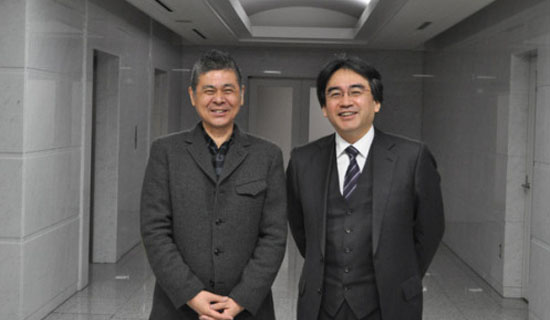(Itoi) When I look at you Mr. Iwata, I feel that you’re always impartial, but isn’t that universally the case with other scientific people as well?
(Iwata) Well let’s say that someone with a shorter company history than me, who is younger than me and has less experience, wrote a program that is shorter and faster than mine. You would clearly understand that that’s “good” right? Even though it does the same thing, if a program is shorter and faster, it’s better. I have respect for that, and learning from it is only natural. A person that can do something that I can’t, whether I like their personality and looks or not, I have respect for them. So what you’re calling impartial may not actually be impartial at all.
(Itoi) Everyone should feel that way in their hearts, but things don’t always work out well between programmers right?
(Iwata) Yes, that happens a lot.
(Itoi) Mr. Iwata, up through college did you go without realizing the sort of leadership you possess now?
(Iwata) I definitely served as class representative, participated in club activities and was on the student council, so I don’t think that was completely unrelated. At that time rather than doing things with a purpose, I just did them and perhaps didn’t think about them too much. At best I think it was at a level of leadership something like “I can hear well because my voice is so loud”.
(Itoi) As I thought, actually working is more of what brought it out in you?
(Iwata) And the company that I happened to get into was very small and I started at it very young, so right away I was involved in decision making.
(Itoi) You started at HAL Laboratory as a part-timer, right? I tell my co-workers the joke that “Mr. Iwata went from being a part-timer to the president!”
(Iwata) That’s right. I started off at HAL Laboratory, but that’s when I was going from my second year of college into my third. I started working full-time when I graduated college.
(Itoi) Did you have any other part-time jobs?
(Iwata) I had other part-time jobs, but that was the only one of this type.
(Itoi) Did you think that it suited you?
(Iwata) ……Maybe I should say “It was interesting that I couldn’t help it”.
(Itoi) When you started your part-time work Mr. Iwata, were there any people that you knew from PC magazines, or any moments of “I see this pen name a lot”? Or were they all just young people?
(Iwata) There was no one who was famous in PC magazines or anything like that, but before I was in high school the phrase “PC” really didn’t exist, and this was a time when there were no PC magazines at all. A calculator served as my introduction to programming. I had a history of making games during class and passing them to the people around me to play.
(Itoi) Ahh, all on such a tiny machine. I didn’t know that before just now.
(Iwata) It was a calculator made by Hewlett-Packard, before any pocket computers were ever released. It was what the shuttle pilots of the Apollo Program brought with them and used to calculate the angle of the antenna.
(Itoi) Are you serious?
(Iwata) I am. This calculator could run those sorts of programs, and it was very expensive at the time. So when I saved up about half of the money from a part-time job washing dishes, my dad paid for the other half.
(Itoi) Thinking “Well if he wants it this much…”
(Iwata) Yes. So then I became completely obsessed with this calculator. No one taught me anything about it, so I just started working it myself. Gradually I started to understand “Oh it can do this”, “Oh it can do that”. Then I sent a game I had made on it to the Japan Hewlett-Packard headquarters.
(Itoi) (Laughs) You did that!?
(Iwata) I guess they were very surprised and thought “Apparently there’s a pretty amazing high school student in Sapporo”. They ended up sending a ton of different things back to me.
(Itoi) I see. Just as I thought, amazing!
(Iwata) Thinking about it now, I wonder if there has been anyone so surprised at Nintendo from high school students sending in something that they could be selling tomorrow. But at the time the person who sent it in didn’t know the value of it (Laughs)
(Itoi) Because they were so engrossed right?
(Iwata) That’s right. I certainly was very engrossed.
(Itoi) But even just gathering the materials for such a thing, it wasn’t like it is now where you could just get them from anywhere.
(Iwata) That’s right. There was no Internet, and no books on the subject.
(Itoi) There weren’t even any in libraries, right?
(Iwata) That’s right. The calculator did come with an instruction manual. The manual was fairly thick, so I read that over carefully……
(Itoi) Was the manual in Japanese?
(Iwata) It mostly was, but to be honest, it was written very oddly.
(Itoi) You probably thought “Get to the point” and didn’t end up able to make anything with it, right?
(Iwata) Yeah, I couldn’t at all at first. But I gradually came to understand it. And when I did I noticed all the things it could do……
(Itoi) You found the original intentions of the person who designed the machine.
(Iwata) That’s how I felt.
(Itoi) Even the person who translated the manual didn’t understand the diagrams, a high school student who read it in Sapporo worked very hard to find another way to arrive at this. Looking at it from a developer’s perspective, would you say something like “You’ve done well to get this far”?
(Iwata) I think so. And that’s how, as a user, I first encountered computers.
(Itoi) That’s so interesting!
